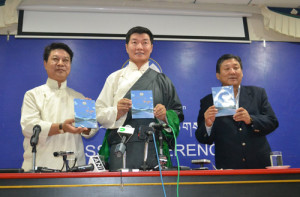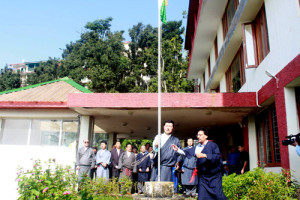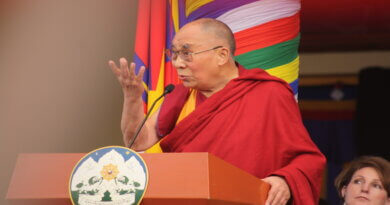US senators urge Obama to raise human rights and Tibet issue during Xi Jinping’s upcoming visit to US in september
DHARAMSALA, Aug 14: Ten US Senators have urged President Obama to raise the deteriorating situation of human rights during Chinese President Xi Jinjing’s visit to the US next month and emphasize to Xi that China should refrain from interfering in the centuries-old system of recognizing reincarnate Tibetan Buddhist lamas.
In a letter written to President Obama, the senators wrote: “We understand that there are many important issues in the U.S.-China bilateral relationship—we expect that China’s recent actions in the East and South China Seas, economic and trade issues, climate change, as well as the recent cyberattacks, will figure prominently in your discussions. While these issues deserve a full and robust exchange of views, so too do human rights…Mr. President, we recognize that managing the U.S.-China relationship is an enormous and complex task. We firmly believe that a full and frank discussion of our concerns regarding human rights and civil society in China would serve to strengthen our relationship.”

Urging President Obama to raise the issue of Chinese interference in selecting the reincarnation of Tibetan Buddhist Lamas, they wrote: “In particular, we hope that you will emphasize to President Xi that China should respect the basic and universally recognized right of religious freedom, to include refraining from persecution of Falun Gong practitioners and from interference in the centuries-old system of recognizing reincarnate Tibetan Buddhist lamas.”
The senators who wrote the letter include, Senator Ben Cardin (D-MD), Ranking Member of the Senate Foreign Relations Committee, and Senator John McCain (R-AZ), Chairman of the Senate Armed Services Committee, along with Senators Pat Leahy (D-VT), Kelly Ayotte (R-NH), Sherrod Brown (D-OH), Tom Cotton (R-AR), Tammy Baldwin (D-WI), Susan Collins (R-ME), Robert Menendez (D-NJ), and John Cornyn (R-TX).
The letter in full appears below:
Dear Mr. President:
As you prepare to welcome Chinese President Xi Jinping to the United States this September, we urge you to make human rights and political reform in China a key and public component of the agenda for your discussions. We understand that there are many important issues in the U.S.-China bilateral relationship—we expect that China’s recent actions in the East and South China Seas, economic and trade issues, climate change, as well as the recent cyberattacks, will figure prominently in your discussions. While these issues deserve a full and robust exchange of views, so too do human rights.
Under President Xi, there has been an extraordinary assault on rule of law and civil society in China. Beginning on July 9, for example, Chinese law enforcement officials have detained or harassed more than 250 lawyers and political activists. These detentions send a chilling message to civil and political rights advocates, and to the Chinese people. Their only crime was to seek to build a stronger and more inclusive China. Therefore, we ask that you call publicly and privately for China’s immediate release of these detained lawyers and activists, or at the very least, that China grant them due process.
President Xi’s draft law for foreign non-governmental organizations (NGOs) would enable the Ministry of Public Security to “supervise” and approve registration of foreign NGOs – forcing NGOs to submit annual work plans and funding allocations for approval directly to the Chinese government. Such scrutiny could mean that important collaborative work on a range of issues considered “sensitive” would come to a halt. Indeed, if this law moves forward, it is likely that many U.S. NGOs, educational institutions, and cultural institutions with active in-country programs would have to pull out of China altogether. The rise of civil society in China has been one of the only human rights success stories of the past two decades, and it is imperative the U.S. speak up to protect it.
There has been a seemingly endless stream of media reports in recent months detailing how civil society groups have been harassed, and how the Xi government has tightened its controls on free expression in academia, the media, and civil society, to include imposing far greater restrictions on the Internet. The Internet serves as a medium for a healthy debate and exchange of views that the Xi government should embrace, not seek to restrain. The Xi government has also issued punitive denials of visa applications for American journalists, writers, and scholars who want to work in China, thus limiting people-to-people exchanges and the opportunity to better understand each other’s culture, politics, and society.
We are also concerned that at a time when President Xi’s government appears set to put in place a draconian anti-terrorism law, cooperation between the U.S. and various parts of China’s domestic security apparatus appears to be gaining momentum. Although we of course understand the imperative for all nations, including China, to take necessary steps to counter violent extremism, an added degree of scrutiny and oversight should be sought before U.S. law enforcement and judiciary organizations partner with Chinese agencies, offices and departments, particularly at a time when China’s internal security apparatus is expanding and remains largely unaccountable.
Finally, we hope that your administration will continue to urge China to end the harassment, detention, and other mistreatment of individuals who seek to peacefully practice their religion, and express their views or seek legal redress. In particular, we hope that you will emphasize to President Xi that China should respect the basic and universally recognized right of religious freedom, to include refraining from persecution of Falun Gong practitioners and from interference in the centuries-old system of recognizing reincarnate Tibetan Buddhist lamas. To these ends, we ask that you press President Xi to immediately and unconditionally release Liu Xiaobo, the 2010 Nobel Peace Prize recipient, and to put an end to the illegal house arrest of his wife, Liu Xia. The 11-year prison sentence given to Liu in 2009 for co-authoring a proposal for political and legal reform in China is, in our view, unreasonable and excessive. We also ask that you draw attention to the cases of Pu Zhiqiang and Xu Zhiyong, both human rights lawyers currently in detention, as well as ask President Xi to review the sentence of Professor Ilham Tohti and seven of his students from Minzu University in Beijing.
Mr. President, we recognize that managing the U.S.-China relationship is an enormous and complex task. We firmly believe that a full and frank discussion of our concerns regarding human rights and civil society in China would serve to strengthen our relationship. We know you share these concerns, and look forward to your thoughts for how these issues will be addressed as part of your upcoming meeting with President Xi, as well as part of the broader set of U.S.-China dialogues and discussions.
Sincerely,
Senator Benjamin L. Cardin
Senator John McCain
Senator Patrick J. Leahy
Senator Kelly Ayotte
Senator Sherrod Brown
Senator Tom Cotton
Senator Tammy Baldwin
Senator Susan Collins
Senator Robert Menendez
Senator John Cornyn



